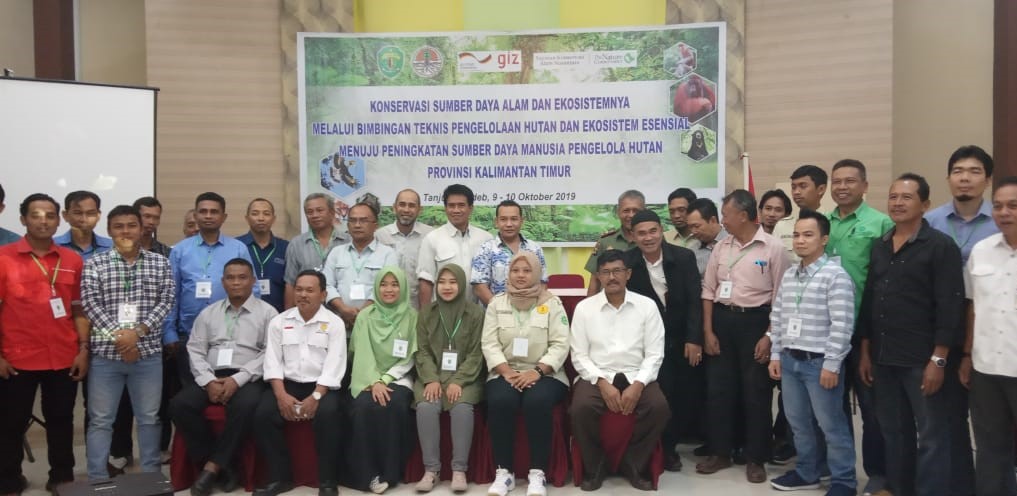FORCLIME
Forests and Climate Change ProgrammeTechnical Cooperation (TC Module)

Select your language
The Directorate of Inventory and Monitoring of Forest Resources (IPSDH) of the Ministry of Environment and Forestry (MoEF) together with FORCLIME conducted a focus group discussion on Technical Guidelines for Bamboo and Rattan Inventory on 17 and 21 October 2019 in Bogor, West Java. The discussion aimed to explore inputs to update the bamboo and rattan inventory guidelines that currently applied. The current dynamics on policy, social and technological requires improvement on the guideline to be updated to be more effective and efficient.
60 participants representing MoEF, researchers, the Indonesian Institute of Sciences (LIPI), universities and the Forest Management Unit (KPH) attended the meeting. There are some findings from the discussion, such as: (1) Indonesia has high-value bamboo and rattan potentials, however, is weak in managing the production and distribution data; (2) Social dynamics in the field are very high but rattan data and bamboo data are not updated so their validity is often doubted; (3) Lack of data makes difficult for the government to develop supporting legislations; (4) At the field level, lack of data has affected the KPH and business actors to develop a sustainable rattan and bamboo business; (5) The dynamics of imagery technology opens opportunities for the development of a large-scale rattan and bamboo inventory method with a more efficient cost; (6) There are several initiatives to develop bamboo and rattan inventory methodology.
After the discussion, the IPSDH Directorate will conduct a series of meetings, public consultation and trials to formulate the Bamboo and Rattan Inventory Technical Guidelines. This technical guide is expected to be implemented in 2020.
For more information, please contact:
Wandojo Siswanto, Strategic area manager for forest policy
M. Rayan, Adviser for cross-cutting issues
Edy Marbyanto, Strategic Area Manager for Human Capacity Development

Aiming to increase the capacity of forest management units at site level, the East Kalimantan Provincial Forestry Service conducted tutoring on forest management and biodiversity based on ecosystem essential values on 9-10 October 2019. The event was carried out in Tanjung Redeb, Berau Regency, and attended by 30 participants, representing the Production Forest Management Unit (KPHP) Berau Barat, KPHP Bengalon, East Kalimantan Province Forestry Service. The activity, supported by GIZ and The Nature Conservancy (TNC), aims to enhance knowledge of participants on the principles and implementation of sustainable forest management by considering important ecosystem values. In addition, the meeting also formed a collaborative forum to protect essential ecosystem areas and high conservation value areas in East Kalimantan.
For further information, please contact:
Suprianto, Technical adviser for sustainable forest management, Coordinator Berau District
Wandojo Siswanto, Strategic area manager for forest policy
The Human Resource Training Center of the Ministry of Environment and Forestry in collaboration with FORCLIME conducted a workshop on Quality Assurance for Environmental and Forestry Training and Education on 14-15 October 2019 in Bogor, West Java. The workshop aims to have similar perception related to the accreditation procedures of the training institution and the procedures for implementing collaborative education through a quality assurance mechanism. This quality assurance is carried out through mentoring by the Human Resource Training Center of the Ministry of Environment and Forestry to government and private training institutions so that the quality of these institutions meets the standards set. The workshop was attended by 60 people representing the Ministry of Environment and Forestry, the Provincial Government Training Center for Human Resources Development, private training institutions, State Administration Institution (LAN) and university’s training institutions.
In his remarks, the Head of the Human Resources Planning and Development Agency (BP2SDM) of the Ministry of Environment and Forestry said that the cabinet work programme emphasizes the development of human resources, so that the quality of the education and training programme needs to be further improved including the capacity of the lecturer.
Head of the Human Resource Training Center of the Ministry of Environment and Forestry said that the annual target is 7,500 trained people, however, due to limited resources, only 50% is achieved. Therefore, cooperation with government and private education and training institutions is a strategy that needs to be developed in the future.
For further information, please contact:
Edy Marbyanto, Strategic area manager for Human Capacity Development


